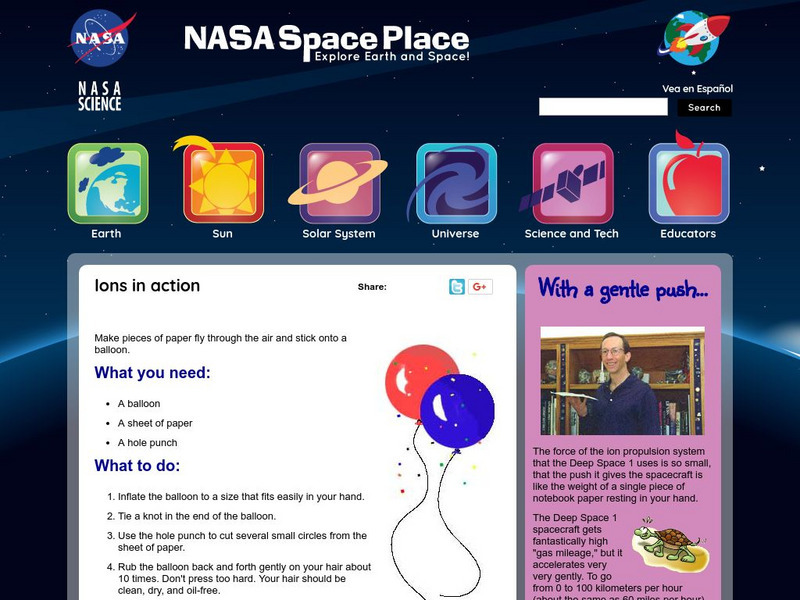Quia
Quia: Common Monotomic Cations and Anions
This page links to a number of fun Java games, designed to help students learn the names and symbols of various ions. Games include matching, concentration and word search.
Clackamas Community College
Clackamas Community College: Polyatomic Ions
Clackamas Community College provides a great explanation of how polyatomic ions form. This page uses Lewis dot notation to explain polyatomics, and several practice problems are provided.
Chem Tutor
Chem Tutor: Chemistry: Writing Ionic Compound Formulas
A tutorial on writing formulas for ionic compounds.
Amethyst Galleries
Fluorite, "The Most Colorful Mineral in the World"
This resource provides information about Fluorite.
Other
Particle Adventure Dutch Version
Dutch version of the well-known "Particle Adventure" physics website that teaches students about atoms, mass, particle physics, and quantum physics. The site discusses theories related to physics and provides other links related to the...
NASA
Nasa Earth Observatory: What Are Aerosols? Fact Sheet
This article discusses tiny particles in the air called aerosols. There are naturally occurring aerosols from volcanic ash, sea spray, grassland fires, and other sources. Learn how scientists believe that aerosols have effects on the...
BBC
Bbc: Gcse Bitesize: Chemistry (Single Science)
This site lists the topics and lessons available for Chemistry. The topics include Particles; Elements, compounds and mixtures; Chemical reactions, Predicting and identifying reactions and products, organic chemistry, and more.
Alabama Learning Exchange
Alex: Balancing Chemical Reactions
Students will participate in a guided inquiry activity using manipulatives to learn how to balance chemical reactions. This activity was developed in cooperation with Michelle Holdbrooks at Thompson High School...
Concord Consortium
Concord Consortium: Target Game
Steer a charged particle to a target. Place particles in the game and charge them to guide a positive projectile around obstacles to hit a target. You can place any number of charged objects in any location to steer the positive particle...
New York University
New York University: States of Water
Use this resource to learn about the three different phases of water; solid, liquid, and gas. What happens to water as it changes into a solid or gas? Includes short and easy to do activity.
Simon Fraser University
Chem1 Virtual Textbook: What Is Light?
Acting as part of an overview on quantum theory, this section of the site answers the question, what is light? In answering the question, specific discussion is directed toward light waves and theories of light.
Simon Fraser University
Chem1 Virtual Textbook: Wave, Particle, or What?
Acting as a subtopic of the General Chemistry Virtual Textbook's section on Atoms and the Periodic Table, this site discusses light, waves, and particles. Part of the discussion involves a definition and working information on the...
Royal Society of Chemistry
Royal Society of Chemistry: Visual Elements: Silicon
Very short entry describing silicon.
Royal Society of Chemistry
Royal Society of Chemistry: Visual Elements: Selenium
Short entry describing selenium and a couple of its uses.
Royal Society of Chemistry
Royal Society of Chemistry: Europium
Short summary of a description of europium, along with its uses.
Royal Society of Chemistry
Royal Society of Chemistry: Erbium
This resource presents a short description of erbium's properties and uses.
Royal Society of Chemistry
Royal Society of Chemistry: Einsteinium
This resource presents a short basic introduction on einsteinium.
Royal Society of Chemistry
Royal Society of Chemistry: Francium
This resource offers a short descriptive summary of francium.
Royal Society of Chemistry
Royal Society of Chemistry: Fermium
This resource presents a short summary of some interesting information on fermium.
Royal Society of Chemistry
Periodic Table: Copper
A short summary of some basic information on copper and how it is used.
Other
Atoms in Motion: Demo
Demonstration of the "Atoms In Motion" app running on an iPad simulator. User interactions and gestures control the entire simulation.
Educaplus (Jesús Peñas Cano)
Educaplus: Propiedades De Los Elementos [In Spanish]
Use this interactive activity to test your knowledge of the different properties of elements according to their position on the periodic table.
NASA
Nasa: The Space Place: Ions in Action
The page from NASA's The Space Place describes a simple activity, charging a balloon and making it move small pieces of paper. It then goes on to give an excellent explanation of how the activity works, and how it involves ions. This...
Other
60 Second Science: Rainbow Gel
Examine mixtures made from different substances, and discover how to make gel.





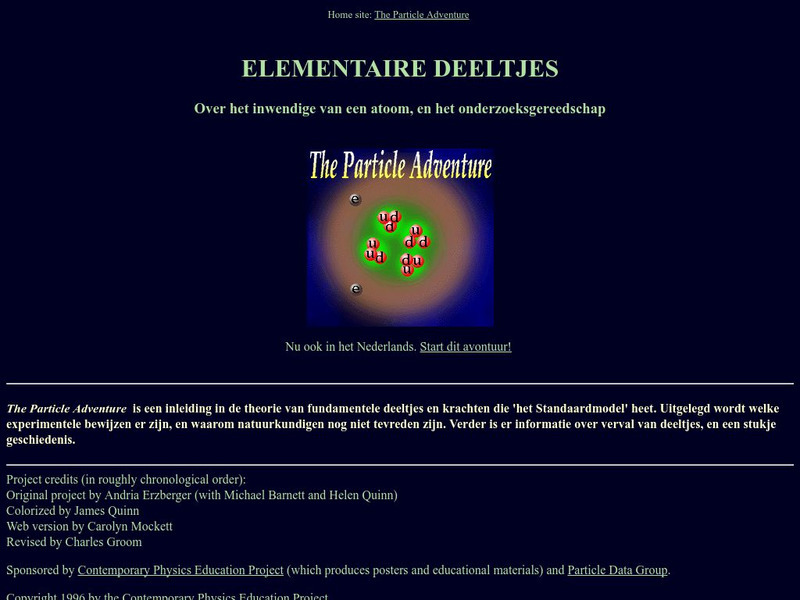




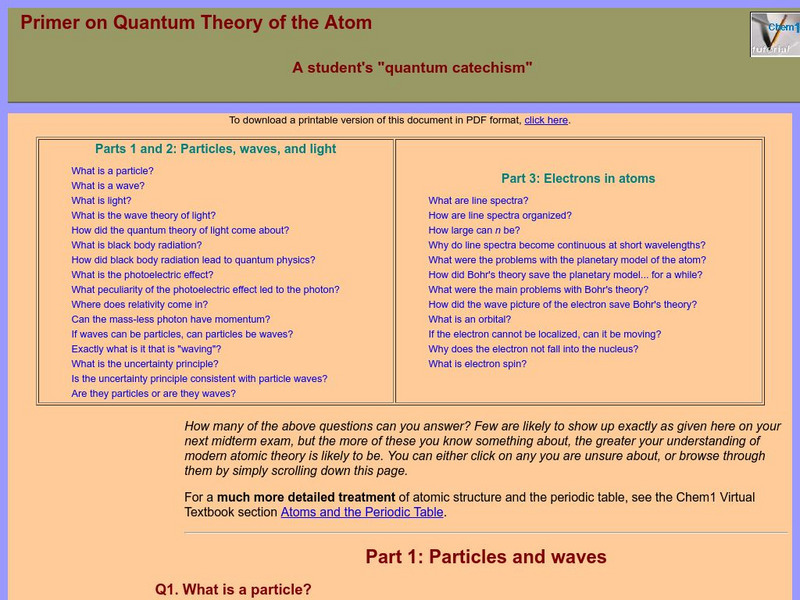





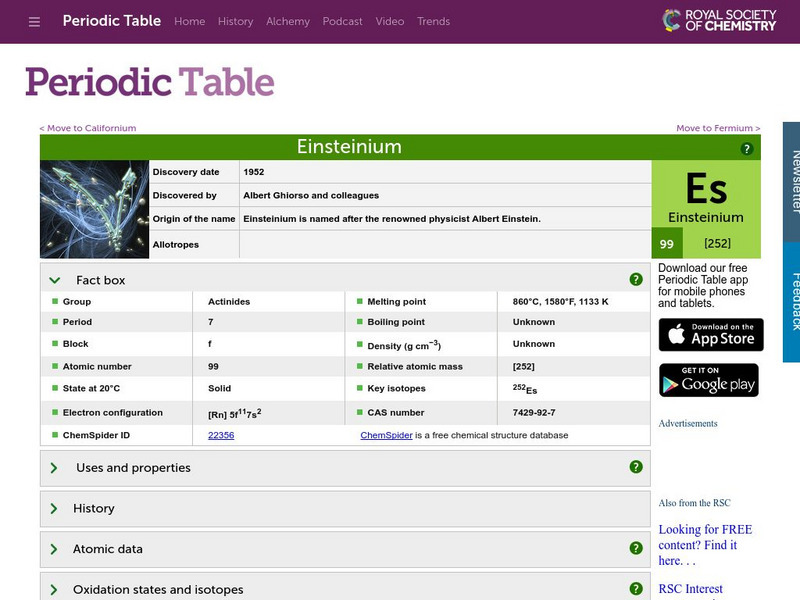
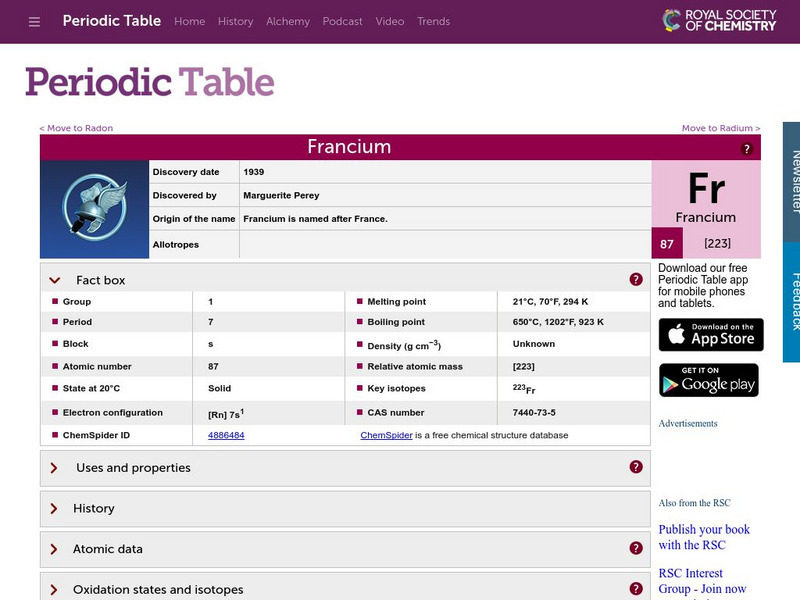


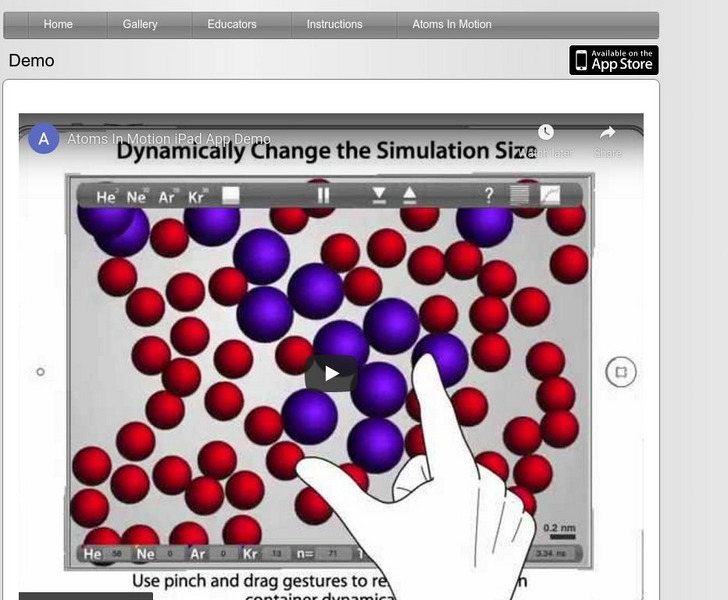
![Educaplus: Propiedades De Los Elementos [In Spanish] Activity Educaplus: Propiedades De Los Elementos [In Spanish] Activity](https://content.lessonplanet.com/knovation/original/120226-c0f6d99ad0a5bdd6d0dc87fdf80ee7f7.jpg?1661774126)
